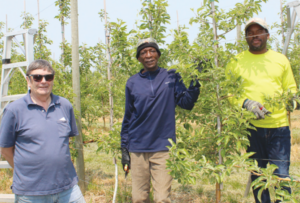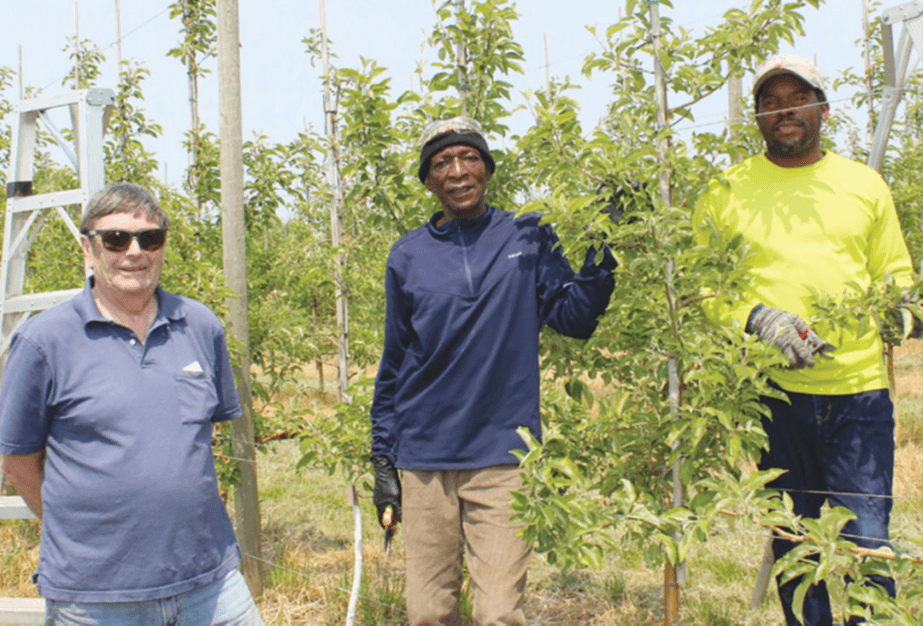
By Kate Russell
Seasonal workers at Nighthawk Orchards outside of Meaford are happy with their home away from home as they prune apple trees in the sunshine.
“We grow these trees from the bud,” said Delroy Martin, who has been travelling from his home in St. Thomas, Jamaica, to work at the orchard since 1989. “We enjoy it a lot. If I didn’t enjoy it, I wouldn’t be here.”
Martin arrives at Nighthawk to work with owner Brian Gilroy in the spring. His long experience is a great benefit to the hard work of pruning and caring for the apple trees through the growing season.
“They’re vital,” said Gilroy of his workers, who he obtains through the federal Seasonal Agricultural Workers Program (SAWP) each year. In an interview at his orchard, where he manages 27 acres. The paperwork and requirements are all worth it as it is very difficult to get any employees locally. “The program is critical. Even 60 years ago it was hard to find workers.”
Gilroy, who was nominated by the Ontario Fruit and Vegetable Growers Association and inducted into the Ontario Agricultural Hall of Fame in June, has always advocated for migrant workers and the challenges agriculture operators have across the province. He spoke at the spring meeting of the Grey County Federation of Agriculture about his continuing concerns about the increasing hurdles and barriers to hosting his foreign workers.
“Housing has become a real dog’s breakfast,” he said of wild accusations by certain groups “advocating about things that just aren’t true.” He suggested the government seems to be listening to activists rather than farmers and the workers themselves. For him to house six workers he has to follow the same guidelines as a boarding house in Toronto. “I want them to feel like they’re home, not like they’re in a boarding house.”
At his orchard, Gilroy has a multi-use building with part of it converted into an apartment. It has a comfortable, large common space, kitchen and full bathroom. There are two bedrooms with bunks for up to six workers, radiant in-floor heating throughout and thick concrete walls keep the space cool during the summer. Fresh water from an artesian spring feeds the building, which has a rental unit upstairs, but it still is required to go through a UV system installed in the building.
“It’s not fancy but it’s functional,” he said during a tour of the space, which is inspected annually by the local public health department. A recent fire inspection called for auto door closures for the bedrooms, as would be necessary in a boarding house. He questioned this, as workers like to leave their doors open for air flow. “This isn’t a boarding house.”
His workers agree and are happy with their accommodations.
“It’s like a house, it’s an apartment,” said Martin, who shares the space with his co-worker Carlos Baker from St. Elizabeth, Jamaica, who has worked at the orchard for 10 seasons now. “It’s a nice place to live,” said Baker. “I don’t like it, I love it. The comfort, the people, the environment. This is a job that brings me close to nature and I love that.”
Despite only making minimum wage in their seasonal jobs, both men support their families with the work they do in Canada. Martin has been able to build a house, buy a car and send his three children to school. He looks forward to retirement, as he will collect a pension from his years of paying into CPP. Baker, who is a carpenter in construction in his home country, has a wife and daughter, who’s a nurse who would like to immigrate to Canada. He is looking into how he might help his family move here.
“They make more in an hour here than they make in a 10-hour day there,” said Gilroy of his workers, who often have extended hours due to the nature of agriculture, which is under separate labour legislation that does not require overtime or statutory holidays. “They are covered by workers’ compensation and OHIP, they actually have more coverage than I do.”
He worries about the future of agriculture if migrant worker programs become more restrictive or increase requirements beyond the ability of farmers to cover costs of doing business. He offered that people are spending up to $50,000 per worker to build new housing for them.
“That’s a sum I couldn’t afford,” he said, offering that he has run his small orchard since 1987 and has seen costs continue to rise every year. He added it was especially difficult during COVID-19 as he had to buy a trailer his workers could quarantine in when they arrived and if they got sick. Random “integrity audits” have hurt some growers he knows as “they can stop the processing of applications during an audit.”
The frustration for growers is real and Gilroy believes continued education of the public is key.
“Less than two per cent of the population is actively involved in farming,” he said, saying he sees his workers as his team. He even visited them once in Jamaica. “They know I depend on them and they depend on me. It has become really important to educate everyone about the realities of agriculture.”
He used to offer sessions at the Royal Agricultural Winter Fair for the chance to talk to urbanites about farming and educate people about the many varieties of apples in Ontario. But now he is more focussed on talking to politicians and policy makers to try to curb the dramatic changes to his business.
“Horticulture could not function in Canada without these kinds of programs. We need these workers,” he said, suggesting people need to follow the rules and be good to their workers, and 99 per cent of growers are compliant to all the requirements. “Policy makers need to have a better understanding of what we do. Walk a mile in our shoes before you make rules for us.”
You can learn more at morethanamigrantworker.ca. ◊

